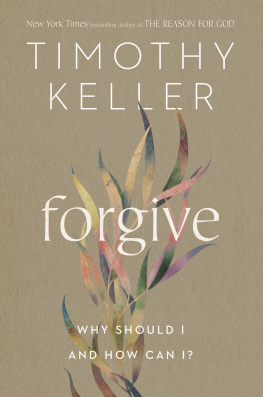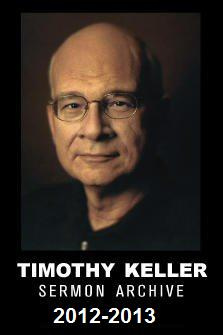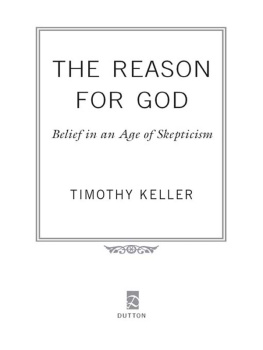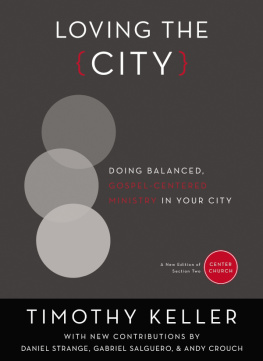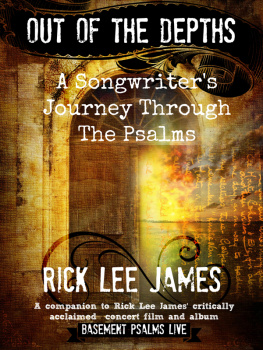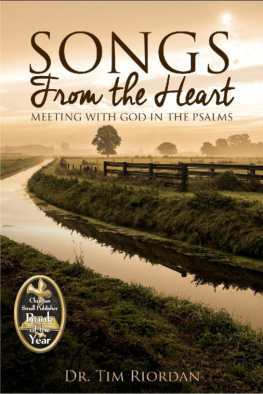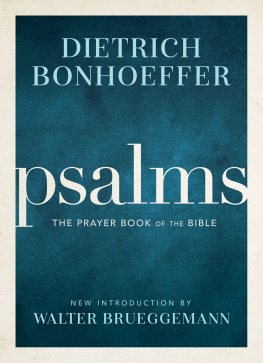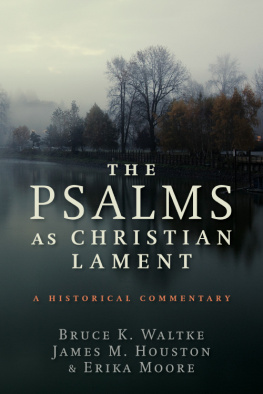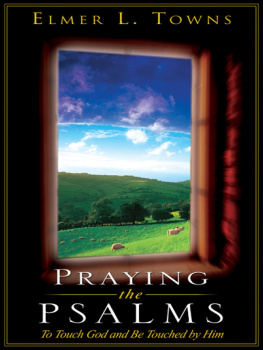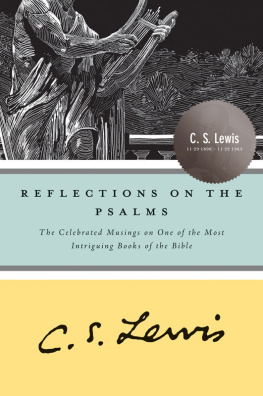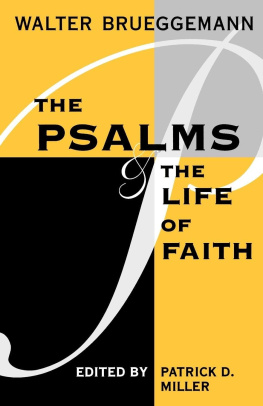Copyright 2015 by Timothy Keller and Kathy Keller Penguin supports copyright. Copyright fuels creativity, encourages diverse voices, promotes free speech, and creates a vibrant culture. Thank you for buying an authorized edition of this book and for complying with copyright laws by not reproducing, scanning, or distributing any part of it in any form without permission. You are supporting writers and allowing Penguin to continue to publish books for every reader.
Scripture taken from the Holy Bible, New International Version, NIV. Copyright 1973, 1978, 1984, 2011 by Biblica, Inc. Used by permission of Zondervan. All rights reserved worldwide. www.zondervan.com. The NIV and New International Version are trademarks registered in the United States Patent and Trademark Office by Biblica, Inc.
INTRODUCTION
The Psalms were the divinely inspired hymnbook for the public worship of God in ancient Israel (1 Chronicles 16:836). Because psalms were not simply read, but sung, they penetrated the minds and imaginations of the people as only music can do. They so saturated the heart and imagination of the average person that when Jesus entered Jerusalem it was only natural that the crowd would spontaneously greet him by reciting a line from a psalm (Mark 11:9; Psalm 118:26).
The early Christians sang and prayed the psalms as well (Colossians 3:16; 1 Corinthians 14:26). When Benedict formed his monasteries he directed that the psalms all be sung, read, and prayed at least once a week. Throughout medieval times the psalms served as the most familiar part of the Bible for most Christians. The Psalter was the only part of the Bible a lay Christian was likely to own. At the time of the Reformation, the psalms played a major role in the reform of the church. Martin Luther directed that the whole Psalter, psalm by psalm, should remain in use. John Calvin prescribed metrical psalms as the main diet of song in worshipping congregations.
All theologians and leaders of the church have believed that the Psalms should be used and reused in every Christians daily private approach to God and in public worship. We are not simply to read psalms; we are to be immersed in them so that they profoundly shape how we relate to God. The psalms are the divinely ordained way to learn devotion to our God.
Why? One reason is that it is what Luther called a mini Bible. It gives an overview of salvation history from creation through the giving of the Law at Mount Sinai, the establishment of the tabernacle and temple, the exile due to unfaithfulness, and it points us forward to the coming messianic redemption and the renewal of all things. It treats the doctrines of revelation (Psalm 19), of God (Psalm 139), and of human nature (Psalm 8) and sin (Psalm 14).
The psalms are more than just an instrument for theological instruction, however. One of the ancient church fathers, Athanasius, wrote, Whatever your particular need or trouble, from this same book [the psalms] you can select a form of words to fit it, so that you... learn the way to remedy your ill. Psalms, then, are not just a matchless primer of teaching but a medicine chest for the heart and the best possible guide for practical living.
In calling psalms medicine I am trying to do justice to what makes them somewhat different from other parts of the Bible. They are written to be prayed, recited, and sungto be done, not merely to be read. Theologian David Wenham concludes that using them repeatedly is a performative act that alters ones relationship [with God] in a way mere listening does not.
The psalms lead us to do what the psalmists doto commit ourselves to God through pledges and promises, to depend on God through petition and expressions of acceptance, to seek comfort in God through lament and complaint, to find mercy from God through confession and repentance, to gain new wisdom and perspective from God through meditation, remembrance, and reflection.
The psalms also help us see GodGod not as we wish or hope him to be but as he actually reveals himself. The descriptions of God in the Psalter are rich beyond human invention. He is more holy, more wise, more fearsome, more tender and loving than we would ever imagine him to be. The psalms fire our imaginations into new realms yet guide them toward the God who actually exists. This brings a reality to our prayer lives that nothing else can. Left to ourselves, we will pray to some god who speaks what we like hearing, or to the part of God we manage to understand. But what is critical is that we speak to the God who speaks to us, and to everything that he speaks to us.... What is essential in prayer is not that we learn to express ourselves, but that we learn to answer God.
Most of all the psalms, read in light of the entire Bible, bring us to Jesus. The psalms were Jesuss songbook. The hymn that Jesus sang at the Passover meal (Matthew 26:30; Mark 14:26) would have been the Great Hallel, Psalms 113118. Indeed, there is every reason to assume that Jesus would have sung all the psalms, constantly, throughout his life, so that he knew them by heart. It is the book of the Bible that he quotes more than any other. But the psalms were not simply sung by Jesus; they also are about him, as we will see throughout this volume.
The psalms are, then, indeed the songs of Jesus.
THE PLAN OF THIS BOOK
This book is a daily devotional that takes the reader through every verse of the book of Psalms in 365 days. In one sense the psalms do not need to be made into a daily devotionalthey are the divinely inspired devotional book.
Many find modern devotionals to be either too upbeat or too sentimental or too doctrinal or too mystical because they reflect the perspective and experience of just one human author. The psalms, by contrast, give us a range of divinely inspired voices of different temperaments and experiences. No other book, even of the Bible, can compete with it as a basis for daily prayer. The New Testament obviously presents Jesus Christ to us in far more explicit and direct ways, yet no part of the New Testament is actually written to be a course of prayed theology that helps you process every possible personal situation through the truth about God.
So the psalms are already Gods devotional book. Nevertheless, most of us need the help of a guide for our first several journeys through the Psalter. Too many of the psalms have complex historical content and can be difficult to understand even after multiple readings. We cant pray a text if we find it utterly confusing.
Each devotional provides you with your daily reading from a psalm. It then gives a brief meditation on the meaning of the psalm and a prayer to help you actually use it in your heart and as a way to approach God. The prayers should be seen as on-ramps, not as complete prayers. The reader should follow the trajectory of the prayers and keep going, filling each prayer out with personal particulars, as well as always praying in Jesuss name (John 14:13).


